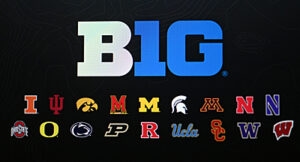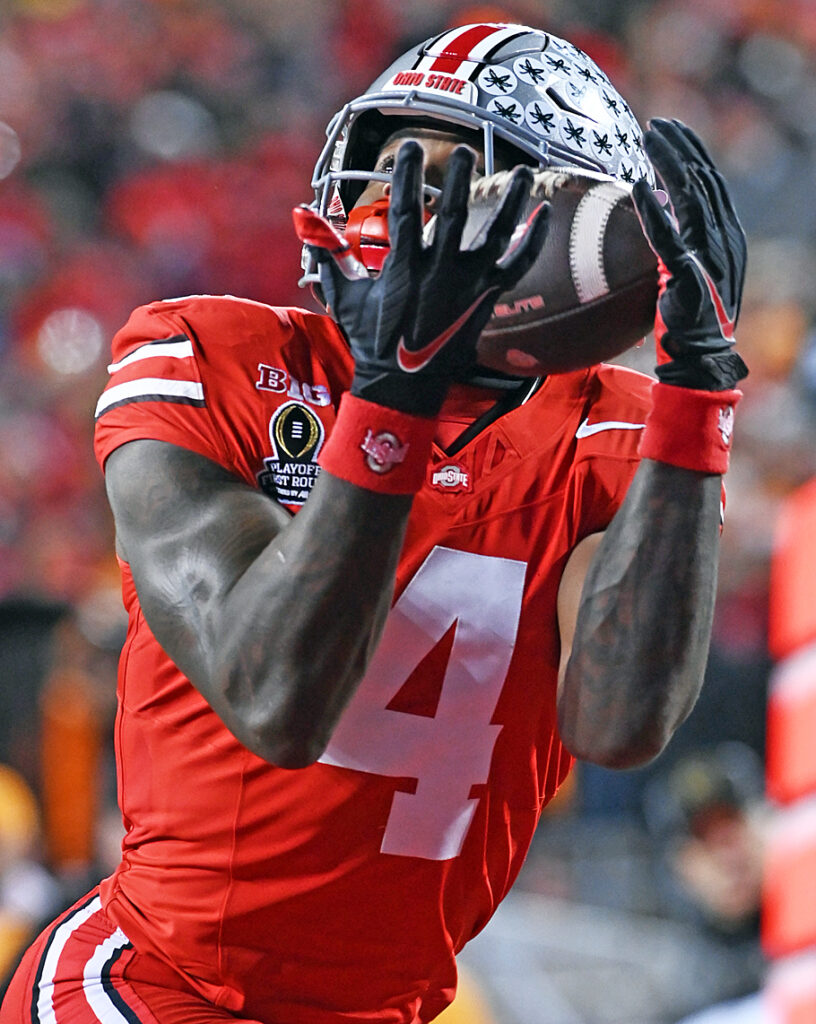Playing Oregon in the Rose Bowl is not about second chances. To win, the Buckeyes must do what they did against Tennessee – play great football and ignore the noise.
 Football tests strength, speed and skill.
Football tests strength, speed and skill.
When talented teams such as Ohio State and Oregon line up, talk trash and snarl at each other, how do you find separation within those three tangibles?
Trained eyes, watching game film till sunrise, struggle to find those separations.

Veteran columnist Jeff Gilbert writes Ohio State football and OHSAA sports for Press Pros Magazine.com.
Ohio State coach Ryan Day says the-always-exciting-talking-point of execution will be the difference against Oregon on New Year’s Day in the Rose Bowl, the most anticipated of the College Football Playoff quarterfinals.
On the field Saturday night after defeating Tennessee 42-17, and during postgame interviews, the Buckeyes celebrated but with a resolve that they aren’t close to being finished. They are clearly on a business mission.
Yet, we ask Day two days later how his team will balance the emotions of playing Oregon again with emotions of what it means to be playing in the playoff. And he never said a thing about emotions or revenge or something to prove. He says he sees a good look in their eye, but that’s focus, not emotion.
“It’s about execution,” Day began.
Of course it is. The team that plays the best wins.

Logan Services, in Dayton, Cincinnati, an Columbus, is a proud sponsor of area sports on Press Pros.
“It’s about our preparation,” he continued, “it’s about how we go about our meetings, how we go about our walk-throughs, how we go about our practices so that when we get out to Pasadena we’re executing at a high level. And that’s what it comes down to.
“Is it super exciting? I guess not. But that’s what it is.”
Oregon defeated Ohio State 32-31 in October. They Buckeyes could have won and believe to a man they should have won. Somewhere in the build up to first day of 2025, players and coaches will remember what it felt like to lose to the Ducks, to want to prove they are the better team.

Focus…concentration…execution…”We blocked better in the Tennessee game, I thought we ran through contact better, and certainly we threw and caught better.” – Ryan Day
But this game can’t be about revenge.
The Michigan game has become about revenge. The Buckeyes focus too much on the outcome, not enough on down-to-down execution. They must be mentally tough enough to focus on the present and doing their jobs on every play.
Day is right. The Rose Bowl, as boring as it sounds, must be about execution. That’s the only way to have a chance to do what you want to do: survive in this tournament and play again. Down by down the Buckeyes proved they could play that way against Tennessee.
To win, Day must be able to repeat what he said after the victory over Tennessee: “We blocked better in this game, I thought we ran through contact better in this game, and certainly we threw and caught better in this game.”
After 24 hours of celebrating a playoff victory, Day reminded his team that nothing they did against Tennessee matters against Oregon.
 “Start from scratch again, identify the things that we think are going to give us an advantage, put those plays in, practice them, then work like heck to make sure that we can execute them against Oregon,” he said.
“Start from scratch again, identify the things that we think are going to give us an advantage, put those plays in, practice them, then work like heck to make sure that we can execute them against Oregon,” he said.
Boring to talk about, but it’s how games are won.
Many questioned Ohio State’s ability to put the Michigan loss behind it, to ignore the noise about Day’s job status, to be able to formulate a winning game plan and prepare the offensive line.
Ask the Orange masses that infiltrated Columbus how the Buckeyes did with that. They’re only used to be getting sent home that sad and speechless by teams like Alabama and Georgia.
Nothing should change this week about the Buckeyes’ mental approach to this game. This is not a revenge tour (for the fans that’s fine, but for the players it’s detrimental). It’s a tour about focus and great execution. Because when the Buckeyes do that, well, you see what you saw on Saturday. The Buckeyes looked like the No. 1 team.
But, oh, how we love to make sports about all the things we feel and the ways we look ahead. Ohio State and Oregon fans will watch the Texas-Arizona State game just before the Buckeyes and Ducks play and discuss what will happen in the next game if their team wins. The teams can’t afford to do that.
And in a rematch game, revenge is the low-hanging emotion we devour.
An accomplished coach once told me revenge shouldn’t be a factor. His reasoning: Why should I ask my team to play harder out of a revenge motive. If I do, that means I didn’t ask them to play that hard when revenge wasn’t a motive.

Will Howard will hope for a better outcome in the rematch with Oregon, but it won’t be out of revenge.
In other words, there should be no difference in effort and execution against Michigan than there is against Western Michigan. Give 100% no matter the opponent, the score, the situation.
Makes sense to me. Always has.
You go play the game to the best of your ability, play with intensity, play to out work the other team, and if that’s good enough, you win. You get another week with your teammates. You get to play another game. Those things maintain proper focus so much more than revenge.
We, the prognosticating public, lean on past results and factor in emotions like revenge. But in sports, just like the stock market, past results do not guarantee expectations up or down. Neither do point spreads. Day was asked Monday about how the loss at Oregon would affect preparation for the Rose Bowl.
Not much.
Day talked about how both teams have evolved. The personnel is mostly the same but tendencies have changed. What about those evolutions? What are they? How will they affect this game?

Huffer Chiropractic can help your athlete perform at their best – with offices in Osgood, Jackson Center, and Dublin, Ohio.
Reporters don’t ask much about game plans before a game. Why should we waste our question on it? Coaches don’t divulge game plans beyond the desire to be balanced. They will talk about the importance of execution, but they aren’t going to divulge state secrets of how they expect victory to be accomplished.
We know they will say the other team is well-coached, has good players and has the same will to win. So we lean on questions about emotions, revenge motives and what it means to play in the Rose Bowl, blah, blah, blah. And the answers usually reveal little.
And when the game ends, we still lean into the intangibles because, as much as we think we know about football, we don’t come close to seeing everything that matters. Neither do the coaches, supposedly. They often answer vaguely and say they need to watch the game film.
So the big plays, big stats and toughness qualities are praised in victory. And in defeat, fault-finding among the media, fans and most atrociously on social media, goes to the intangibles that can’t be completely proven from press boxes, stadium seats, recliners or barstools.
We amateurs think we have the intangibles figured out. We analyze emotions and difficult-to-judge coaching acumen, and we call for firings and benchings. It’s our right whether we have a clue or not.
And if Ohio State wins, the revenge motive will be asked. But don’t expect an answer that credits revenge. Yes, quarterback Will Howard will reference that victory tasted a lot better than the taste he left Autzen Stadium with in October.
 But overall, talk will center on execution, on play makers, on defense. And, if all that goes right, the Buckeyes must take that same mindset to the Cotton Bowl for the semifinals. The media, me included, will say the eighth-seeded Buckeyes are the team to beat.
But overall, talk will center on execution, on play makers, on defense. And, if all that goes right, the Buckeyes must take that same mindset to the Cotton Bowl for the semifinals. The media, me included, will say the eighth-seeded Buckeyes are the team to beat.
So instead of pushing down the revenge motive, the Buckeyes must push down complacency. And to advance again, they must tangibly rely on strength, speed and skill.
And execution.

